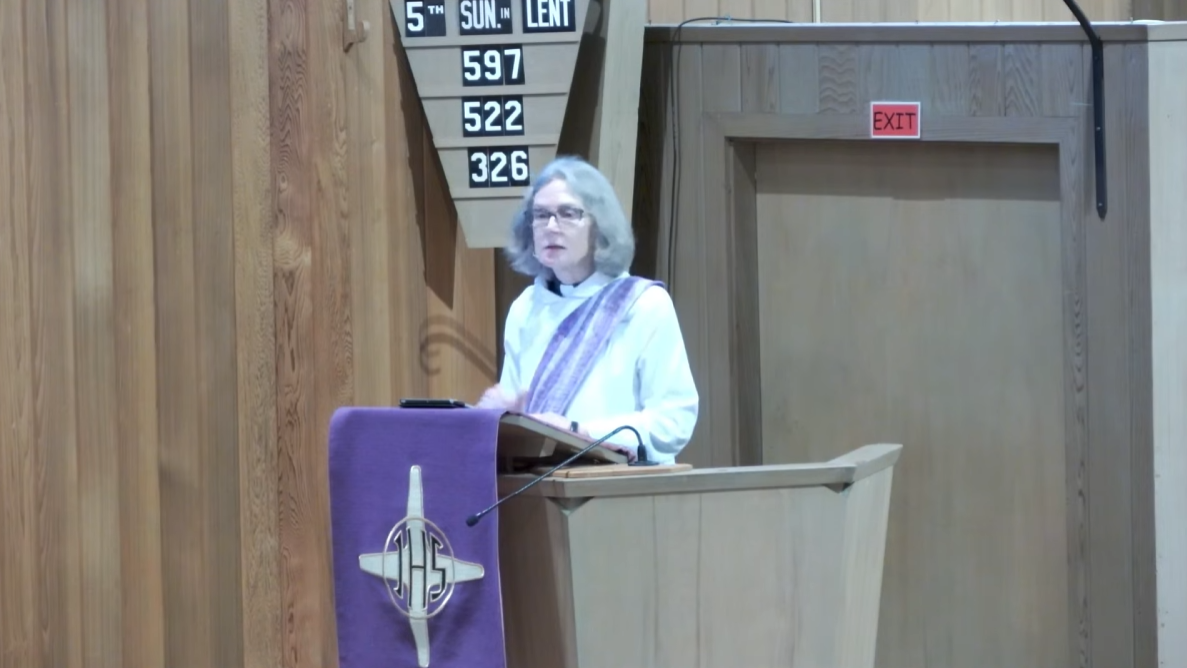The Sweet Fragrance of God’s Extravagant Love

This week I’ve been thinking about the sense of smell, one of the many senses of the human body, through which we can experience the world around us. As we go through our daily lives, we are apt to smell many different odors – some sweet smelling; some stinky; some that make us mouths water and some that make our stomachs turn; some familiar to us; some new to us; some that transport us back to an earlier, perhaps happier, time in our lives; and some that remind us of a time of sadness or grief.
I’m wondering – What do you think is the most obnoxious odor – the most distinctive and unpleasant scent – that you could smell? A baby’s stinky diaper, perhaps? Or maybe rotten food in the refrigerator? How about the pungent smell of fire, as a house is burning down? Or the lingering stench from the body of a person who has beed dead for 4 days?
The lingering stench of death permeates through the gospel reading this morning.
It is six days before the Passover, one of the holy times of the year when Jewish people from all of Galilee and Judea go up to Jerusalem, to worship at the temple. As a faithful Jew, Jesus would have traveled into Jerusalem every year to observe the Passover.
Passover, of course, is the story of the deliverance of the Hebrew people, being led out from slavery in Egypt into the freedom of the promised land that God had prepared for them. It marks the time when God made a way in the Red Sea, a path in the mighty waters; and brought out the Egyptian chariot and horse, army and warrior; and extinguished them like a wick, as we heard from Isaiah. And the Hebrew people were set free.
Jewish people continue to observe the Passover every year, remembering and retelling the story of their liberation, following the directions God gave Moses (that are recorded in the book of Exodus).
This year the date of Passover overlaps with Holy Week – Passover begins with sundown on Saturday, April 12, and ends with nightfall on Sunday, April 20 (which Christians observe as Resurrection of Our Lord; i.e., Easter ). This year, Christians and Jews will both be observing their most holy days during the same week, both recalling when God brought new life out of death and freedom out of slavery; celebrating when God set God’s people free.
Back to the gospel reading…
Jesus is on his way to Jerusalem for the Passover. He knows the risk of going there; he knows his life is in danger; the religious leaders are plotting to kill him. His teaching and healing and feeding people – all signs of his divine power and authority – are threatening the status quo; the religious leaders are afraid to upset the Roman authorities; afraid that the empire will retaliate with more violence and destruction against them.
Jesus lives in political times; his homeland is under the brutal occupation by the Roman Empire. Life is not easy for Jesus and his people. Yet Jesus is not afraid to speak out against the authorities; he is not afraid to speak truth to power, in support of the poor and the stranger and women and men; the people who live on the margins of society. Jesus speaks out in response to the love he knows God has for all people. Jesus speaks out to proclaim God’s kin-dom on earth.
On his way to Jerusalem, Jesus stops in Bethany, a village outside Jerusalem, to stay at the home of his friends; the siblings, Lazarus, Martha and Mary. This is the same Lazarus whom Jesus brought back from the tomb – having been dead for 4 days – just a short time ago. This is the same Martha who had declared to Jesus “Yes, Lord, I believe you are the Messiah, the Son of God, the one coming into the world.” This is the same Mary who knew Jesus would have healed Lazarus before he died, if Jesus had been there in time.
Clearly these are 3 of Jesus’ closest friends and his most devoted followers.
So the siblings gather with Jesus, 6 days before the Passover, in the safety of their home, at the dinner table together, with the lingering stench of death permeating the air; the stench from Lazarus’ death and the stench of knowing that soon Jesus also will die – he will be killed by the Roman Empire because his Spirit-filled words of truth and his powerful deeds of love threaten the Empire.
And then something unexpected happens. Mary takes a pound of a fragrant and very expensive oil and anoints Jesus’ feet and wipes them with her hair.
Mary’s extravagant, some might say wasteful, outpouring of love in this act of service foreshadows Jesus’ own act of love and service with his disciples. In a few days, at the Last Supper, Jesus will wash his disciples’ feet. Then he will tell them this: “…if I, your Lord and Teacher, have washed your feet, you also ought to wash one another’s feet. For I have set you an example, that you also should do as I have done to you.” (John 13:14-15). Foot washing is a way of serving one another with love; it is a sign of discipleship.
And Mary’s extravagant, some might say wasteful, outpouring of love foreshadows Jesus’ own impending death. In this intimate and tender moment, Mary anoints Jesus for his death.
Mary’s extravagant, some might say wasteful, outpouring of love foreshadows the extravagant love God has for all God’s people.
As the fragrance of the perfume fills the house, the sweet smell of new life overcomes the lingering stench of death. The fragrance is a sign of hope for what is to come; it is a resurrection moment.
As followers of Jesus, we believe that God can – and does – bring life out of death. God can – and does – make a way in the wilderness and rivers in the desert. God can – and does – make new things spring up. Sometimes we can perceive the new thing God is doing; sometimes, like Judas, we are slow to catch on to the new thing God is doing.
Still, we trust, we believe, we know, we hope…that God, the extravagant and loving Creator of the cosmos, is at work in us and in the world, making all things new, in ways that we do not yet see.
And, in response, in faith and love and joy, we persevere in the work God has given us to do – the work of sharing God’s extravagant, some might say wasteful, outpouring of love with all God’s creation.
In faith and love and joy, we continue to live out the promises we make when we affirm our baptism; when we are asked if we intend to continue in the covenant God made with us in holy baptism:
- To live among God’s faithful people
- To hear the word of God and share in the Lord’s supper
- To proclaim the good news of God in Christ through word and deed
- To serve all people, following the example of Jesus
- To strive for justice and peace in all the earth
Now is the time – in this season of great uncertainty and growing distress in our country and this time of transition for Holy Trinity – now is the time to savor the sweet fragrance of new life that is ours through the death and resurrection of Jesus Christ. Now is the time to pour out that sweet fragrance of new life on everyone around us – pour out the extravagant, some might say wasteful, love of God through our thoughts, words and deed; through our love for all God’s people. Now is the time. For we are the aroma of Christ to God among those who are being saved and among those who are perishing… (2 Cor 2:15)

